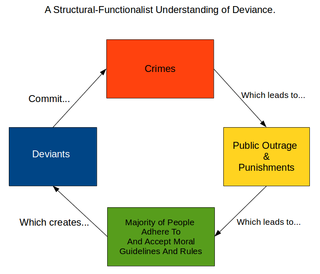Related Research Articles
A psychiatrist is a physician who specializes in psychiatry, the branch of medicine devoted to the diagnosis, prevention, study, and treatment of mental disorders. Psychiatrists are physicians and evaluate patients to determine whether their symptoms are the result of a physical illness, a combination of physical and mental ailments or strictly mental issues. Sometimes a psychiatrist works within a multi-disciplinary team, which may comprise clinical psychologists, social workers, occupational therapists, and nursing staff. Psychiatrists have broad training in a biopsychosocial approach to the assessment and management of mental illness.

Forensic psychiatry is a subspeciality of psychiatry and is related to criminology. It encompasses the interface between law and psychiatry. According to the American Academy of Psychiatry and the Law, it is defined as "a subspecialty of psychiatry in which scientific and clinical expertise is applied in legal contexts involving civil, criminal, correctional, regulatory, or legislative matters, and in specialized clinical consultations in areas such as risk assessment or employment." A forensic psychiatrist provides services – such as determination of competency to stand trial – to a court of law to facilitate the adjudicative process and provide treatment, such as medications and psychotherapy, to criminals.

The Institute of Psychiatry, Psychology and Neuroscience (IoPPN) is a research institution dedicated to discovering what causes mental illness and diseases of the brain. In addition, its aim is to help identify new treatments for them and ways to prevent them in the first place. The IoPPN is a faculty of King's College London, England, previously known as the Institute of Psychiatry (IoP).
John Rawlings Rees,, also known as 'Jack' or 'J.R.', was a British civilian and military psychiatrist.
Sheldon Glueck was a Polish-American criminologist. He and his wife Eleanor Glueck collaborated extensively on research related to juvenile delinquency and developed the "Social Prediction Tables" model for predicting the likelihood of delinquent behavior in youth. They were the first criminologists to perform studies of chronic juvenile offenders and among the first to examine the effects of psychopathy among the more serious delinquents.
William Walter Menninger, known by his peers as "Dr. Walt", is an American psychiatrist in the third generation of the Menninger family, which has run the Menninger Foundation since 1925. He served as dean of the Karl Menninger School of Psychiatry and Mental Health Science and he was the CEO of the Menninger Clinic from the 1993 to 2001. During his tenure as CEO, the clinic began negotiations to move from Topeka, Kansas, to Houston, Texas, where it is affiliated with Baylor College of Medicine.

Lawrence Coleman Kolb was an American psychiatrist who was the New York State Commissioner of Mental Hygiene from 1975 to 1978.
William Alanson White was an American neurologist and psychiatrist.

Vladimir Petrovich Serbsky was a Russian psychiatrist and one of the founders of forensic psychiatry in Russia. The author of The Forensic Psychopathology, Serbsky thought delinquency to have no congenital basis, considering it to be caused by social reasons.

The Serbsky State Scientific Center for Social and Forensic Psychiatry is a psychiatric hospital and Russia's main center of forensic psychiatry. In the past, the institution was called the Serbsky Institute.
Alan Abraham Stone was an American psychiatrist who was the Touroff-Glueck Professor of Law and Psychiatry (Emeritus) at the Harvard Law School. His writing and teaching has focused on professional medical ethics, issues at the intersection of law and psychiatry, and the topic of violence in both law and in psychiatry. Stone served as president of the American Psychiatric Association. He also served for a number of years as the film critic for the Boston Review.
Carl Schneider, professor at Heidelberg University, (1933–1945) chairman of its department of Psychiatry, director of its clinic, was a senior researcher for the Action T4 euthanasia program.

Gabriel Langfeldt was a Norwegian psychiatrist. He was a professor at the University of Oslo from 1940 to 1965. His publications centered on schizophrenia and forensic medicine. He was involved as an expert during the trial against Hamsun, and wrote a book about Quisling.
Eleanor Touroff Glueck was an American social worker and criminologist. She and her husband Sheldon Glueck collaborated extensively on research related to juvenile delinquency and developed the "social prediction tables" model for ascetaining the likelihood of delinquent behavior in youth. They were the first criminologists to perform studies of chronic juvenile offenders and among the first to examine the effects of psychopathy among the more serious delinquents.
David Abrahamsen was a Norwegian forensic psychiatrist, psychoanalyst, and author who wrote analyses of Richard M. Nixon and David Berkowitz.
Bernard Charles Glueck Jr. was an American psychiatrist. He served as director of research at The Institute of Living, now part of Hartford Hospital. He is known for his work on transcendental meditation as part of preventive psychiatry.
Bernard Glueck may refer to:
Marion Edwena Kenworthy, M.D. (1891-1980), an American psychiatrist and psychoanalyst, introduced psychiatric and psychoanalytic concepts to the education of social workers and to the field of social work.

Abraham Myerson (1881–1948) was a Lithuanian neurologist, psychiatrist, clinician, pathologist, and researcher. He had a special interest in the heredity of psychiatric and neurologic disease.
David Philip Farrington is a British criminologist, forensic psychologist, and emeritus professor of psychological criminology at the University of Cambridge, where he is also a Leverhulme Trust Emeritus Fellow. In 2014, Paul Hawkins and Bitna Kim wrote that Farrington "is considered one of the leading psychologists and main contributors to the field of criminology in recent years."
References
- ↑ Staff report (October 9, 1972). Defense Figure in Leopold and Loeb Trial Is Dead. The New York Times
- ↑ Lebensohn, Zigmond M. (1973). In memoriam: Bernard Glueck Sr. Am J Psychiatry 1973;130:326-326.
- ↑ Ploss, Donna E. (July 31, 1999). A promise Kept, a journey together. Hartford Courant